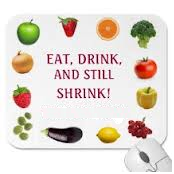The first step to losing weight most of the time is actually
eating MORE calories. When I talk to people or they come to me for
advice they often tell me they are eating around 1,000 calories and not
seeing any kind of change in their body.
It is crazy to think that eating more calories will help you lose weight but it is the truth.
For so long we have had in our heads that the fewer calories we consume then the weight will come off. It would just make sense wouldn't it? I am here to share with the world and be one more person to help change the way way people view calories and losing weight.
Your body needs food to survive and it actually needs at least like 1,200 hundred just to make it through the day without wanting to sleep 24/7 especially if you are lightly active.
Calories are used for all your daily functions, including breathing, talking, digesting, walking, and, of course, working out.
However, if you consume more calories than you burn, it doesn't shoot out of your ears as steam or anything like that. Instead, the body turns it into body fat to be converted to energy at some future date.
In other words, when you eat more calories than you burn, you put on fat. This is the case whether you're eating carbs, fat, or protein.
So the question is maybe you do not know how many calories you need to consume in a day. There are many free websites out there for you to use to give you a rough estimate based on your age height activity level etc. One such as FreeDieting.com is a common one used.
I just never recommend you using the "extreme" caloric range. If you are killing yourself in the gym and the weight isn't moving but your calorie intake is so low your body will just shut down.
You may actually become more sick because your body doesn't have enough to replenish itself. Then you may become discouraged and want to give up when you do not see change. From there, subtract 500 calories and that's probably a good deficit for weight loss. (But make sure that number stays about 1,200. Anything lower can be dangerous in the long term.) Conversely, if you're trying to gain muscle mass, add 300 calories or so-but make sure you're also doing a solid weight lifting program. Here is another way you may want to calculate also:
Sedentary lifestyle (desk job): Current weight in pounds x 12 = Maintenance Caloric Needs.
Moderately active lifestyle (server in a restaurant and/or doing one of our entry level programs) Current weight in pounds x 13 = Maintenance Caloric Needs.
Highly active lifestyle (construction worker and/or: Current weight in pounds x 14 = Maintenance Caloric Needs.
It is crazy to think that eating more calories will help you lose weight but it is the truth.
For so long we have had in our heads that the fewer calories we consume then the weight will come off. It would just make sense wouldn't it? I am here to share with the world and be one more person to help change the way way people view calories and losing weight.
Your body needs food to survive and it actually needs at least like 1,200 hundred just to make it through the day without wanting to sleep 24/7 especially if you are lightly active.
Calories are used for all your daily functions, including breathing, talking, digesting, walking, and, of course, working out.
However, if you consume more calories than you burn, it doesn't shoot out of your ears as steam or anything like that. Instead, the body turns it into body fat to be converted to energy at some future date.
In other words, when you eat more calories than you burn, you put on fat. This is the case whether you're eating carbs, fat, or protein.
So the question is maybe you do not know how many calories you need to consume in a day. There are many free websites out there for you to use to give you a rough estimate based on your age height activity level etc. One such as FreeDieting.com is a common one used.
I just never recommend you using the "extreme" caloric range. If you are killing yourself in the gym and the weight isn't moving but your calorie intake is so low your body will just shut down.
You may actually become more sick because your body doesn't have enough to replenish itself. Then you may become discouraged and want to give up when you do not see change. From there, subtract 500 calories and that's probably a good deficit for weight loss. (But make sure that number stays about 1,200. Anything lower can be dangerous in the long term.) Conversely, if you're trying to gain muscle mass, add 300 calories or so-but make sure you're also doing a solid weight lifting program. Here is another way you may want to calculate also:
Sedentary lifestyle (desk job): Current weight in pounds x 12 = Maintenance Caloric Needs.
Moderately active lifestyle (server in a restaurant and/or doing one of our entry level programs) Current weight in pounds x 13 = Maintenance Caloric Needs.
Highly active lifestyle (construction worker and/or: Current weight in pounds x 14 = Maintenance Caloric Needs.





